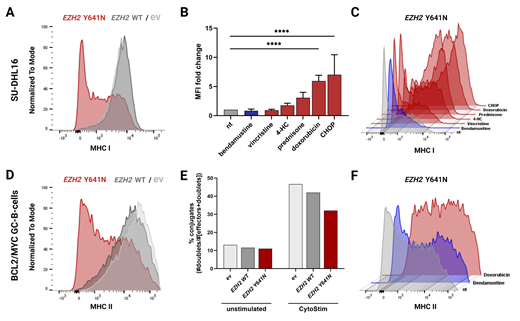Abstract
Chemotherapy combined with anti-CD20 antibodies is the standard treatment for patients with symptomatic advanced stage follicular lymphoma (FL). We have previously shown that EZH2 gene mutations were predictive of differential efficacy of the chemotherapy backbone within the GALLIUM trial (NCT01332968; Jurinovic, ASH 2019). Specifically, patients with EZH2 mutant FL had significantly longer progression free survival with CHOP-based immunochemotherapies as compared to patients with EZH2 wild type FL. In contrast, the EZH2 mutation status was not predictive of treatment outcome in patients receiving bendamustine-based regimens. The underlying biology is unclear.
Mutations in EZH2, a histone methyltransferase, occur in 25-30% of FL and mostly affect the Y641 residue within the catalytic domain, resulting in more efficient conversion of H3K27me2 to H3K27me3. First, we tested differences in chemosensitivity in lymphoma cell lines that harbor the FL-hallmark translocation t(14;18)[BCL2/IGH] and intrinsic EZH2 mutations (Karpas422, OCI-Ly1, SU-DHL4, DB) or no EZH2 mutation (SU-DHL16, WSU-FSCCL, OCI-Ly8, OCI-Ly19). Treatment with CHOP (4-hydroperoxycyclophosphamide (4-HC), doxorubicin, vincristine, and prednisone), alone or in combination, or bendamustine revealed marked differences in IC50 for cell viability (CellTiter Glo) and apoptosis (Annexin V) between cell lines, but no correlation with EZH2 mutation status. To better control for cell line specific effects, we stably expressed EZH2 Y641N or wild type (WT) in the EZH2 WT cell line SU-DHL16. EZH2 mutant cells indeed showed significantly increased H3K27me3 levels compared to EZH2 WT cells. However, we did not observe differences in global cellular phenotypes, including cell proliferation and cell cycle phases. Furthermore, IC50 for cell viability and apoptosis with CHOP and bendamustine treatment were not significantly different.
As we could not identify differences in direct cytotoxic responses, we hypothesized that EZH2 mutations might indirectly affect treatment efficacy, by altering the interaction of FL cells with their tumor microenvironment (TME) in response to chemotherapy. In a mouse model, Ennishi et al. had previously shown that Ezh2 mutant lymphomas have reduced MHC expression and T-cell infiltrates (Cancer Discovery, 2019). Here, we could show that expression of mutant EZH2 in human SU-DHL16 cells also leads to almost complete MHC-I loss by flow cytometry (Fig A). MHC-I loss was fully reversible when cells were treated with increasing doses of tazemetostat, a specific EZH2 inhibitor, or interferon-gamma. Interestingly, treatment with 4-HC, prednisone, doxorubicin and CHOP also resulted in increasing restoration of MHC-I expression in EZH2 mutant cells, while bendamustine (and vincristine alone) had no impact on MHC expression (Fig B,C).
Next, we used a fully human B-cell co-culture model (modified from Caeser et al., Nat Comm 2019) for validation and functional studies. Mirroring the TME-dependence of FL, germinal-center (GC) B-cells from human tonsils immortalized by transduction with BCL2 and MYC absolutely require follicular dendritic cell (FDC) support plus IL21 and CD40L for sustained growth. Stable expression of EZH2 Y641N in these GC-B-cells led to increased H3K27me3 levels as compared to EZH2 WT and empty vector (ev) controls, but did not result in FDC+IL21/CD40L independent growth. Again, we observed significantly lower MHC-I/II expression on EZH2 mutant cells (Fig D). Importantly, we show that EZH2 mutation-induced MHC loss resulted in reduced CytoStim-stimulated conjugate formation when cells were co-cultured with autologous CD4 T-cells isolated from the same tonsils (Fig E). Finally, treatment with doxorubicin but not bendamustine resulted in significant upregulation of MHC-I/II on EZH2 mutant GC-B cells (Fig F). Co-culture experiments with autologous CD4 and CD8 T-cells with and without doxorubicin, CHOP and bendamustine treatment are ongoing to analyze the EZH2 mutation-specific chemotherapy effects on T-cell activation, recruitment, and T-cell mediated killing.
In conclusion, our data indicates that the particular chemosensitivity of EZH2 mutant FL to CHOP is not the result of differences in direct cytotoxicity, but -unlike bendamustine- is rather mediated by restoring EZH2 mutation-induced MHC-I/II loss, thereby potentially promoting cytotoxic T-cell responses.
Hodson: Astra Zeneca: Research Funding. von Bergwelt: Kite/Gilead: Honoraria, Research Funding, Speakers Bureau; BMS: Honoraria, Research Funding, Speakers Bureau; Astellas: Honoraria, Research Funding, Speakers Bureau; Roche: Honoraria, Research Funding, Speakers Bureau; Miltenyi: Honoraria, Research Funding, Speakers Bureau; Mologen: Honoraria, Research Funding, Speakers Bureau; Novartis: Honoraria, Research Funding, Speakers Bureau; MSD Sharpe & Dohme: Honoraria, Research Funding, Speakers Bureau. Subklewe: MorphoSys: Research Funding; Novartis: Consultancy, Research Funding, Speakers Bureau; Seattle Genetics: Consultancy, Research Funding; Roche: Research Funding; Janssen: Consultancy; Klinikum der Universität München: Current Employment; Takeda: Speakers Bureau; Pfizer: Consultancy, Speakers Bureau; Miltenyi: Research Funding; Gilead: Consultancy, Research Funding, Speakers Bureau; Amgen: Consultancy, Research Funding, Speakers Bureau; BMS/Celgene: Consultancy, Research Funding, Speakers Bureau. Weigert: Janssen: Speakers Bureau; Roche: Research Funding; Epizyme: Membership on an entity's Board of Directors or advisory committees.


This feature is available to Subscribers Only
Sign In or Create an Account Close Modal